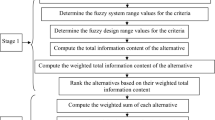Abstract
The successful implementation of a condition based predictive maintenance strategy for engineering equipment depends to a large extent in the very choice of such systems. CM systems have certain design parameters that suggest their ability to detect an onset of failure and predict the time of ultimate failure. It is obvious that a CM system with higher values of these parameters can deliver better results. However it is not only difficult to comprehensively quantify these parameters but also evaluate their utility in the overall operation and maintenance of equipment. In this paper a fuzzy inference system (FIS) based elicitation of these parameters has been proposed in a multi-objective optimisation framework using genetic algorithm. The results provide the maintenance decision maker with several options to choose from based on the overall objectives of the plant and install a suitable CM system.












Similar content being viewed by others
References
Amari SV, McLaughlin L, Pham H (2006) Cost effective condition based maintenance using Markov decision processes. In: Proceedings of RAMS-06. IEEE Computer Society, Washington, pp 464–469
Billinton R, Allan RN (1992) Reliability evaluation of engineering systems-concepts and techniques, 2nd edn. Plenum Press, New York, pp 260–306
Cai KY (1996) System failure engineering and fuzzy methodology-an introductory overview. Fuzzy Sets Syst 83:113–133
Carnero M (2006) An evaluation system of the setting up of predictive maintenance programmes. Reliab Eng Syst Saf 91:945–963
Deb K (2001) Multi-objective optimization using evolutionary algorithms. John Wiley & Sons, Ltd, Chichester
Deb K (2005), NSGA-v1.1. Available: http://www.iitk.ac.in/kangal
Holmberg K, Folkeson A (1991) Operational reliability and systematic maintenance. Elsevier Applied Science, London
Jardine AKS, Lin D, Banjevic D (2006) A review on machinery diagnostics and prognostics implementing condition-based maintenance. Mech Syst Signal Process 20:1483–1510
Kothamasu R, Huang SH, VerDuin WH (2006) System health monitoring and prognostics–a review of current paradigms and practices. Int J Adv Manuf Technol 28:1012–1024
Verma AK, Srividya A, Ramesh PG (2008) Machinery condition monitoring system selection—a multi-objective decision approach using GA. In: Proceedings first international conference on emerging trends in engineering and technology. IEEE Computer Society, Huntsville, pp 787–792
Verma AK, Srividya A, Ramesh PG (2011) A systems approach to integrated e-maintenance of large engineering plants. Int J Syst Assurance Eng Manag (Submitted)
Wang M (2003) Using fuzzy linguistics to select optimum maintenance and condition monitoring strategies. Mech Syst Signal Process 17(2):305–316
Author information
Authors and Affiliations
Corresponding author
Rights and permissions
About this article
Cite this article
Verma, A.K., Srividya, A. & Ramesh, P.G. FIS based selection of CM system design parameters from a multi-objective optimisation model using GA. Int J Syst Assur Eng Manag 2, 14–20 (2011). https://doi.org/10.1007/s13198-011-0050-0
Received:
Revised:
Published:
Issue Date:
DOI: https://doi.org/10.1007/s13198-011-0050-0




